Institutional Context
Summary
The Royal Agricultural University is a world leading, specialist institution located in Cirencester (Gloucestershire). From our foundation our focus has been on improving agriculture through research and education. Today our purpose is more vital and relevant than ever – ‘to care for the land’ - enabling communities locally, nationally and globally to thrive in harmony with nature to meet the most pressing challenges in the world today, such as climate change, food security, sustainable land use, biodiversity loss and heritage management. As the leading specialist University providing expertise on the land, agri-food and rural enterprise sectors we aim to support and enable our communities through this time of transition, turbulence and uncertainty and equip a new generation to thrive through change.
Institutional context
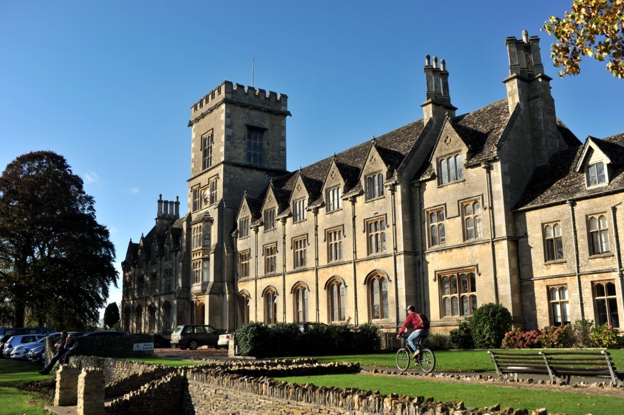
The Royal Agricultural University (RAU) is a world leading, specialist institution founded as the Royal Agricultural College in 1845 that gained University status in 2013. The University is located in Cirencester (Gloucestershire). From our foundation our focus has been on improving agriculture through research and education. Today our purpose is more vital and relevant than ever – ‘to care for the land’ - enabling communities locally, nationally and globally to thrive in harmony with nature to meet the most pressing challenges that face us in the world today, such as climate change, food security, sustainable land use, biodiversity loss and heritage management. As the leading specialist University providing expertise on the land, agri-food and rural enterprise sectors we aim to support and enable our communities through this time of transition, turbulence and uncertainty and equip a new generation to thrive through change.
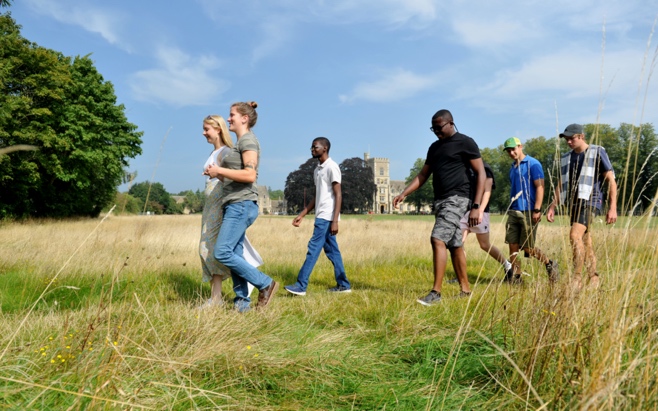
The RAU Strategy and Vision leads through:
Quality, with a global reputation for excellence
Reach, with a growing, diverse and inclusive community in the UK and globally
Sustainability, as a showcase for sustainable and resilient management
In the last few years, the RAU has transformed and repositioned our research and knowledge exchange strategies, culture and support systems with the aim of deepening our portfolio of entrepreneurial activity and business engagement and expanding this for the future. RAU's vision for the next ten years is to become the leading research intensive, specialist university focused on the land, economy and food-supply sectors, collaborating expertly and becoming a recognised solutions provider for Government, industry, voluntary bodies, civic society and other academic institutions, both in the UK and around the world.
Our Knowledge Exchange approach focuses our activities around the following areas:
Sector and policy leadership - providing intellectual influence, unique collaborative strategic insight and innovative thinking to address the policy challenges facing governments and rural industries, for example high level advice, engagement and consultancy
Innovation and entrepreneurial support and acceleration – facilitating farm and land-based practitioner-led innovation and sharing of best practice, accelerating the establishment and growth of rural enterprises and businesses
Professional development of leadership and skills - providing world-leading focused programmes in rural, agricultural and agri-food supply chain management and leadership so that individuals develop the skills, strategic insight and business acumen required to lead and manage businesses
Civic mission – recognising the needs and concerns of the public and our communities, the challenges we face both as individuals through to those on a global scale, and responding to these with a breadth and depth of timely, accessible and tailored activities
Research – building our research portfolio and capacity, in particular of entrepreneurial applied research
Capital projects – improving our current estate and leading new large scale, multi-faceted projects as platforms for industry, governments, sector bodies, the public and the community as well as supporting state-of-the-art academic teaching and research collaboration
Knowledge Engagement support – strategically establishing and building our own capacity and networks to support staff, students and wider audiences driving and delivering our knowledge engagement activity
For further information, please send queries to esther.wilkinson@rau.ac.uk
Local Growth and Regeneration
Summary of approach
The RAU prides itself on being a specialist, distinctive and world leading institution, punching above our weight in both our reach and achievements.
Our support for local growth and regeneration has a core county and regional focus, however our knowledge exchange activities make a significant contribution to national policy and economic growth. We have made a step change in our policy engagement and influence, whilst building on our bedrock programmes and initiatives in innovation and entrepreneurial support and delivering world-leading executive education.
Our global footprint is expanding; we have grown our partnerships and networks, providing influence and collaboration contributing to global growth and regeneration, and underpinning our vision to be the UK’s global university for sustainable farming and land management.
Aspect 1: Strategy
The Royal Agriculture University (RAU) is a specialist University located within the Gloucestershire Cotswolds. Our knowledge Exchange (KE) approach is driven by societal need, and by local, regional, national and global challenges, which we deliver through an evidence-based, practice-led approach across a dynamic integration of research, policy and practice.
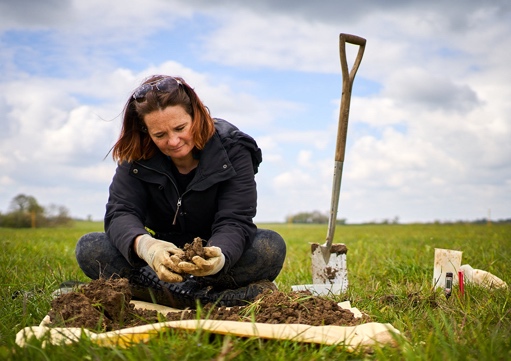
Our support for local growth and regeneration has a core focus around Gloucestershire, but also the wider Cotswolds and South West, including Wiltshire, Warwickshire and Oxfordshire. We lead and advise on the development of innovative policy and practical solutions for local growth and regeneration, making a significant contribution to the local economy. Our wider partnerships allow us to influence and inform national policy and strategically engage globally, developing best practice and adaptive solutions, which in turn inform our knowledge base that can then be applied locally.
The Strategic Economic Plan for Gloucestershire, led by GFirst LEP – the Local Enterprise Partnership for Gloucestershire - aims to drive inclusive growth and secure an economy fit for the future, which benefits everyone who lives and works in the county. This includes developing the skills of workers in high-growth sectors through to supporting business start-ups. We also engage with the Gloucestershire Local Industrial Strategy (LIS), published in 2019 which aligns with the UK’s Industrial Strategy, as well as local groups including Gloucestershire Local Enterprise Partnership’s Agri-food and Rural Business Group, the Gloucestershire Local Nature Partnership, and South Gloucestershire Council’s Food Strategy.
At a national level, we have key engagements including with the UK Industrial Strategy, the Department for Food and Rural Affairs (DEFRA), UK Research and Innovation (UKRI) and the National Food Strategy.
Our international networks are substantial and growing; we are a ‘university without walls’, with vision to be the UK’s global university for sustainable farming and land management. Our international activities in teaching, learning and collaborative research provide a bedrock to significantly extend our partnerships and networks, providing influence and collaboration towards global growth and regeneration. In 2022 we established a partnership with the International Agriculture University, Tashkent, Uzbekistan. This exciting new initiative is helping support and stimulate local teaching and research in agriculture to suit Uzbekistan’s conditions and work towards its international trade ambitions.
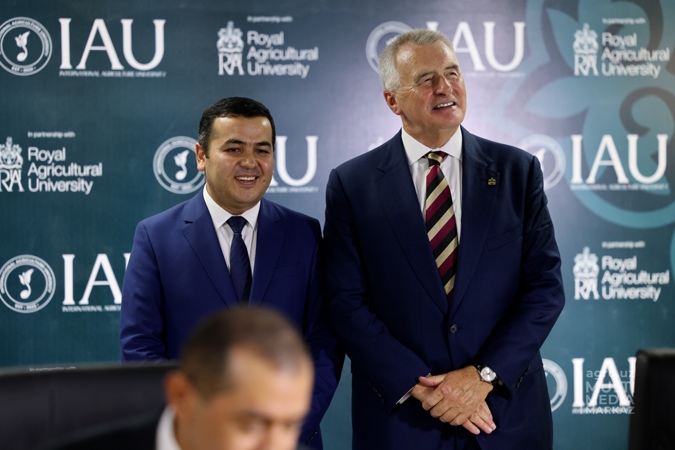
We undertake focused research, with a significant global perspective, through our doctoral research community and through our active connections with Central Asia and sub-Saharan Africa. Our approach to research has been formulated around collaborations between researchers, farmers and innovators.
Aspect 2: Activity
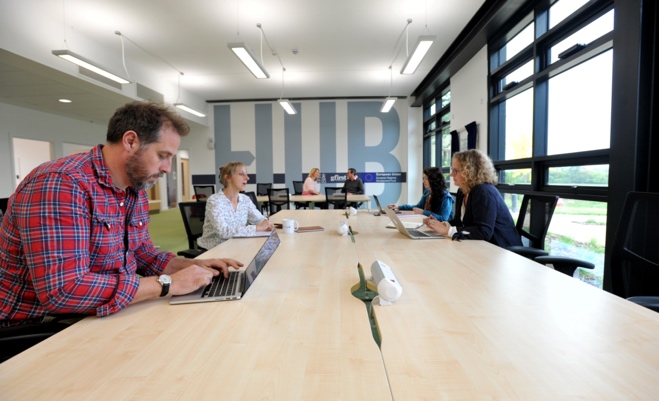
Our knowledge exchange approach focuses around seven core areas of activity:
Sector and policy leadership
Innovation and entrepreneurial support and acceleration
Professional development of leadership and skills
Civic mission
Research
Capital projects
Knowledge Exchange support
The activities detailed below provide examples in all but two of these areas, representative of the breadth and depth of our portfolio and evidence of our investment, impact and growth achieved through the period of this report. The activities are complementary and synergistic to those detailed in ‘Public and Community Engagement’.
Sector and policy leadership
The RAU provided initial support and seed funding to develop the Gloucestershire Food & Farming Partnership (GFFP). This initiative is developing and coordinating the delivery of a sustainable and healthy food strategy for our county. Through our involvement in the National Innovation Centre for Rural Enterprise (NICR) – funded by UKRI’s Research England Development Fund – we are supporting our local university partners and the Countryside & Communities Research Institute (CCRI) to lead work for the GFFP to address the barriers to local procurement.
RAU academics worked with the GFirst Local Enterprise Partnership on the Agri-food and Rural Economy Report for Gloucestershire, which resulted in advanced agri-technology being embedded into the draft Gloucestershire Local Industrial Strategy (2019).
Our engagement with DEFRA includes developing Environmental Land Management Schemes; changing policy on landscape management and delivering net zero; convening the Government Nutrient Management Expert Group providing advice to DEFRA, and contributing to the Expert Group on Organic Production on developing organic policy within the different nations of the UK.
We are active in national and international animal welfare policy, developing a collaborative policy position for the Farm Animal Welfare Forum (FAWF). The collaboration between the FAWF, Compassion in World Farming, Food Animal Initiative, Global Coalition for Animal Welfare, Marks and Spencer, the RSPCA and the Soil Association resulted in the Animal Welfare Forum report in February 2020, supporting the development of Government action plans and pathways for animal health and welfare.
The RAU has hosted several international visits including the US Department of Agriculture Chief Economist and the Angolian Ambassador to the UK.
Innovation and entrepreneurial support and acceleration
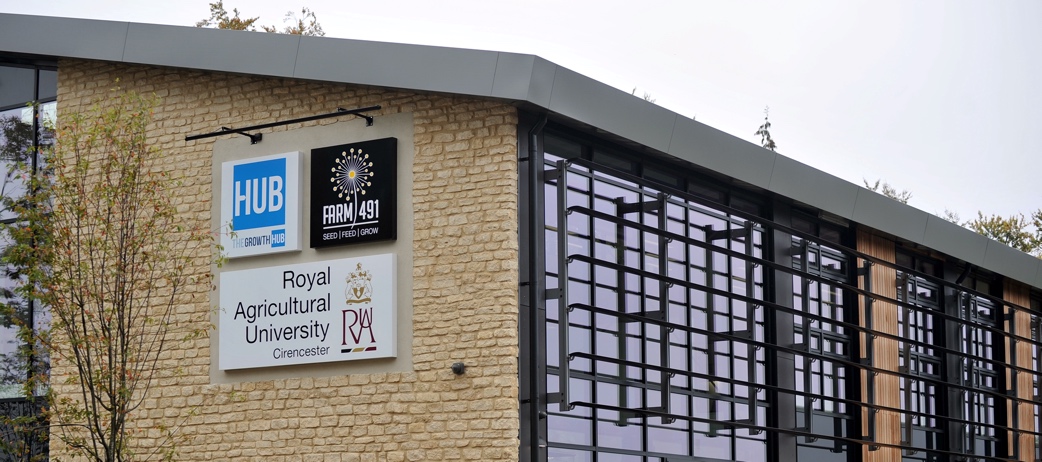
Through European and LEP funding we operate the Cirencester Growth Hub and Farm491, the UK's leading agri-technology incubator and accelerator, located at the Alliston Centre on our Cirencester campus. This co-location brings together our research activities, the UK Industrial Strategy, food, farming and environmental strategies locally, nationally and internationally. Our approach is focussed around ‘students and academics meet innovators’.
Farm 491 has been instrumental in supporting companies to identify, share and engage with innovation opportunities in the agri-food sector. Commissioned in mid-2016, Farm491 received European Regional Development Fund investment to support the growth of local AgriTech start-ups, which led to 69 beneficiaries receiving fully-funded support within the county. The programme addressed productivity and growth challenges identified in GFirst LEP’s European Structural and Investment Funds (ESIF) Strategy for Gloucestershire. Currently 60 active business members are supported by seven external innovation and business advisors with a range of skills and experiences, providing advice on topics including new product development, international markets and business coaching.
The Cirencester Growth Hub is a joint project with GFirstLEP. Since opening in July 2018, the Hub has directly supported more than 500 local businesses, hosted over 200 business events and workshops, and is currently providing professional workspace to 40 SMEs. The Hub offers one-to-one business advice, workshops, affordable and professional coworking space, a collaborative community, incubator offices and meeting rooms. Community support from the Cirencester Growth Hub is provided through annual sponsorship of the Cirencester Chamber of Commerce (CCOC) Young Entrepreneur Award as well as providing meeting room and events space, further establishing a strong local connection.
Other Enterprise and Entrepreneurship activities include:
Our student-focused Enterprise and Entrepreneurship Programme (EEP) provides an inspiring and supportive environment in which students can share, develop and launch their business ideas. Support is designed to encourage progression and nurture budding entrepreneurs to develop their business concepts alongside their own skills and knowledge. EEP has supported idea development and business creation from both home and international students, with four graduates on RAU endorsed Start-up visas.
The Farmer-Led Innovation Network (FLIN), was established by the RAU in 2018 to share knowledge and provide a collective advocacy voice for farmers to understand, learn from and ‘power-up’ farmer-led innovation initiatives and increase their economic, environmental and social impact across the industry. The Network brings together approximately 1,500 farmers directly involved in farmer-led innovation across the UK, as well as 20 organisations including governmental and non-governmental organisations, research institutes, the levy board, farmer organisations, advisory services and SMEs, including the Agriculture and Horticulture development Board; Natural England; Rothamsted Research; Innovation for Agriculture; the Community and Countryside Research Institute; the Agricultural development and Advice Service; and the Farming and Wildlife Advisory Group Southwest.
The Centre for Effective Innovation in Agriculture (CEIA) is a collaboration with four agricultural universities: the University of Warwick, the University of Reading, Harper Adams University and Newcastle University to put farmer priorities at the heart of agricultural innovation research. The Centre aims to increase the adoption of innovation by farmers by helping researchers and funders better align their effort and investments with user needs. CEIA works closely with UKRI and DEFRA to help design innovation and research funding with the Farming Innovation Programme generating more meaningful engagement with producers. Through CEIA, we also provide the secretariat for the Agricultural Universities Council UK (AUC) which convenes the 16 UK universities that provide research and teaching in agriculture.
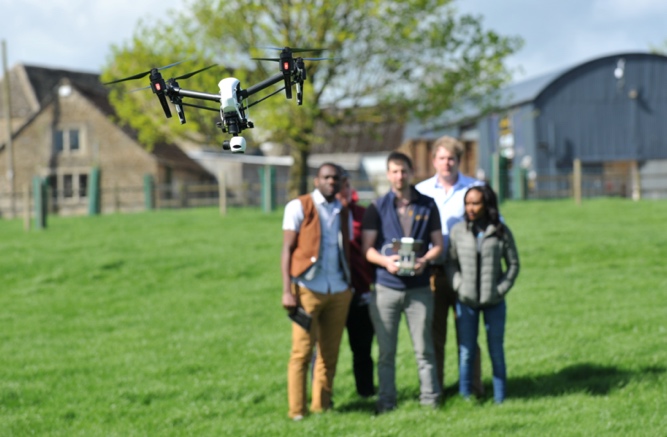
Professional development of leadership and skills
Development of skills and business acumen lies at the heart of our KE activities. The RAU has a strong reputation in providing world-leading professional training and development programmes and skills-based training run in collaboration with charities and industry bodies.
Since 2002 the Royal Agricultural University has been one of the industry’s leading providers for business owners and senior managers through exemplar executive education provision. Courses inspire, encourage and develop excellence in the management and leadership of UK agriculture through three leading executive education programmes:
The Institute of Agriculture Leadership Development Programme
Worshipful Company of Farmers Advanced Course in Agricultural Business Management
John Edgar Trust Management Development Programme
Delegates come from a range of backgrounds including farmers, farming managers, contract farmers, farming advisors, supply chain managers and representatives of industry organisations, many of which have become sector leaders, bringing this transformational learning and development back to their businesses and communities.
We offer a series of Continued Development Courses (CPD) ranging from ‘Insight into Agriculture’, delivered by SME’s and focused on those who support the agriculture industry but with no background in farming; ‘Wayleave Officers’ courses, attracting audiences predominantly from the National Distribution Network and Utilities industry; and ‘Financial Business Management’ which introduces specific business management tools, coupled with a detailed understanding of supporting successful business delivery for those actively involved in the management of a farming or diversified rural business. Courses range from being residential, to dispersed and online and attract between 10-25 attendees per course.
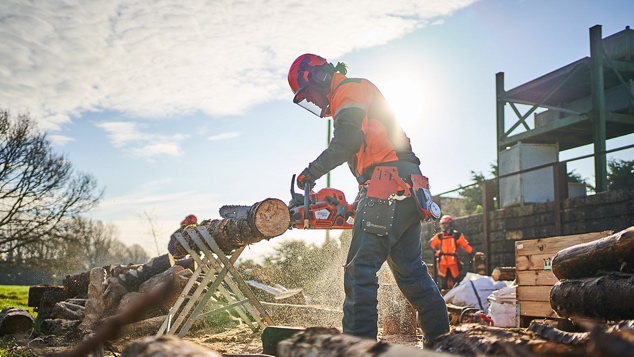
The John Oldacre Rural Innovation Centre (JORIC) offers hands-on Rural Skills courses for both students and external participants giving access to a range of modern equipment to value to the learning experience. Courses can lead to qualifications from recognised awarding bodies such as City & Guilds and Lantra. JORIC is a Registered Training Provider with The Forestry Training Fund and is in the process of applying to become a City & Guilds Assessment Centre. External participants attend from companies such as Bromford Housing Association, Gloucestershire Wildlife Trust, and National Trust.
Research
In 2019, the RAU adopted a new five-year institutional research strategy, operating in the space between pure and applied research, providing both societal impact and underpinning our knowledge exchange activities. Through our extensive industry connections with the landbased and food supply sectors we have developed relevant and agile research projects and innovative methodologies. Access to farmland and related facilities (which we either own or lease) enables us to undertake long-term field-based research projects, often decadal in length, while our partnerships with larger universities and research institutes have enabled us to conduct world-class research, often interdisciplinary in nature.
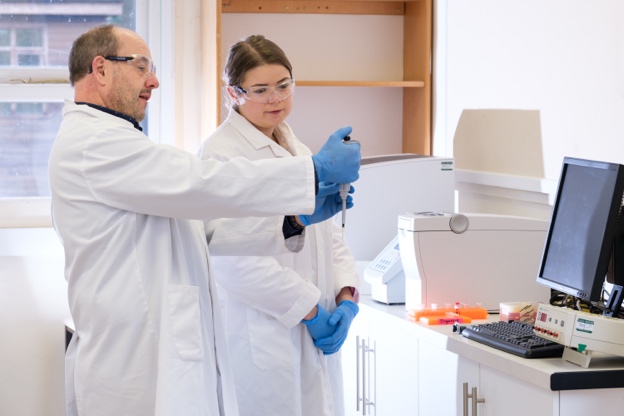
Capital Projects and Estate
The RAU's Cultural Heritage Institute was established in 2020, located in the Railway Village in Swindon (Wiltshire). This £1.8M investment by Swindon Borough Council is a facility for research and teaching in cultural heritage, located adjacent to the headquarters of multiple national heritage bodies as well as UKRI. This co-location provides opportunities to enable our land-based research to influence national policy.
Launched in 2022, our flagship project, ‘Innovation Village’ aims to support industry, food producers, farmers, and landowners in developing sustainable solutions for healthy land and nature, food production and resilience in rural communities. The RAU has committed an investment of £100M and has the support of the Department of International Trade (DIT), Gloucestershire County Council and GFirst LEP.
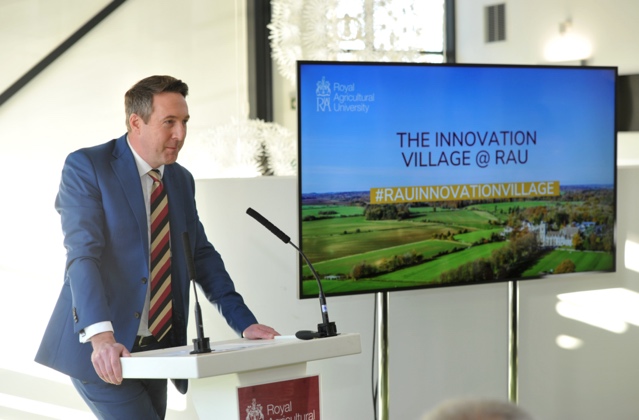
Aspect 3: Results
The activities detailed below provide examples and evidence of outcomes and impacts of the RAU KE portfolio including their demonstrable communication:
Our professoriate provided expert advice to the independent National Food Strategy in 2021, the biggest and highest profile review of food policy in the past 50 years. The final report set out 14 recommendations, of which seven have been fully or partially implemented.
Our cultured meat and farmers project explores the implications of cultured (lab-grown) meat for UK farmers, funded under UKRI’s ‘Transforming Food Systems’ programme. This attracted substantial interest from farmers and the farming and regional media, including coverage in Farmers Weekly, Farmers Guardian and BBC Points West. The project, which brings together over a dozen stakeholder partners from the cultured meat industry, farming and NGOs, will be completed in 2024.
The RAU has provided expert input to the Food, Farming & Countryside Commission (FFCC) contributing substantially to FFCC’s strategic direction and to specific initiatives including the ‘Beyond the Food Bank’ project. This convened the major charitable funders of food banks to develop a shared long-term theory of change, working with beneficiaries and community organisations around the UK to address current crises of food insecurity while developing longer term resilience.
Academics delivering a collaborative research project funded through Pro Press UK, the Waltham Centre for Pet Nutrition, the Fred and Marjory Sainsbury Trust and CIFRE (France) resulted in the first commercial high-temperature steamer for steaming hay for feeding horses. Rapid up-take prompted the spinout of MSME Haygain Ltd, supplying steamers to the the recent World Equestrian Games. The research undertaken at RAU with our collaborators in developing this method of hay steaming has had a significant impact on the global equine industry.
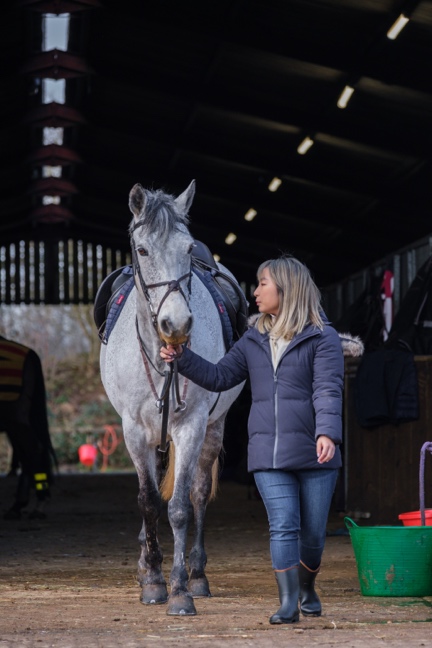
Since 2018, Farm491 has supported over 200 AgriTech start-ups, and members have raised over £34 million in investment and created over 120 new jobs. This focus led to the creation of a strong investor network of over 40 Venture Capitalists and ‘angels’ across the UK who have a passion for AgriTech.
The RAU achieved Centre of Excellence status for Enterprise Learning for another three years in September 2022. Previously the RAU won the Institute of Enterprise and Entrepreneurs (IOEE) Enterprise Learning Provider of the Year in 2019 when it became one of only six universities (and the only specialist provider) recognised as a ‘National Centre of Excellence’ for enterprise learning. In 2020 the RAU was also shortlisted as ‘outstanding entrepreneurial university of the year’.
Since 2013, the Enterprise and Entrepreneurship Programme has funded 97 applicants to develop their business concepts with 69 innovators launching their businesses after leaving the University. Between September 19 – July 22 Student Enterprise have hosted 84 business start-up support events; engaged 163 students with our enterprise activities and provided £28,015 of funding to students.
The RAU currently has two student focused social enterprise projects ‘Cotswold Hills Wine’ and ‘Muddy Wellies Ale’, providing the opportunity for our students to develop their enterprise and entrepreneurial skills, whilst proceeds go towards our proof of concept ‘First Steps’ fund to support students to start their own businesses. The RAU became the first UK vineyard to can fizzy wine in 2018 (having now sold 21,000 cans) and launch an eco-flat wine bottle in 2022, reducing the carbon footprint of the wine by over 50% and winning a bronze award at a global packaging design competition. The social enterprise project featured on BBC primetime TV, as part of the Hairy Bikers Go Local. Cotswold Hills is listed in over 200 outlets, including over 100 Mid-Counties Co-Op stores.
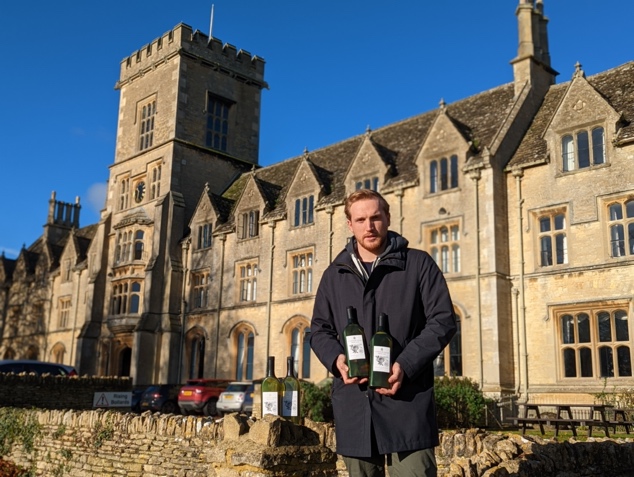
Public & Community Engagement
Summary of approach
The RAU is proud of its ‘place’ and its place in history, a university with a strong civic mission that recognises historic and contemporary culture, with a central role in local, national and international communities. At a time of great global uncertainty, our public engagement recognises and responds to the needs and concerns of the public in our mission to support wellbeing, health and growth in the communities we serve.
We have wide and established networks, stunning accessible estates, and a diversity of approaches tailored to engage in dialogue with our communities. The RAU established an important local role through the pandemic, utilising our experience to adapt and develop as an organisation and provides support our university peers in Ukraine.
Aspect 1: Strategy
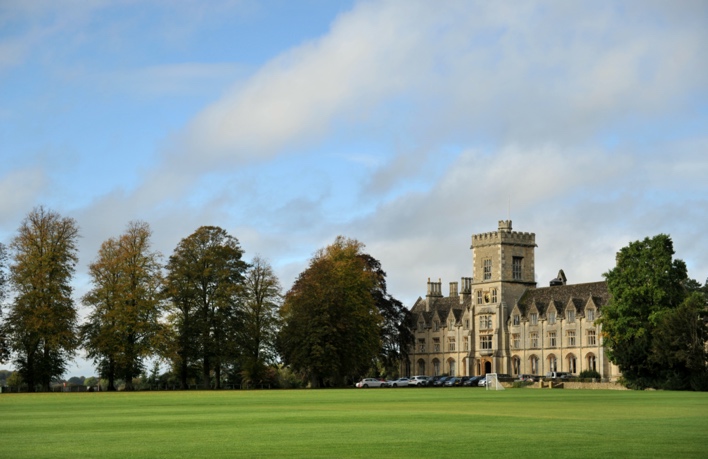
Over the last year, the Royal Agricultural University (RAU) has been developing a new organisational Strategy for the period 2023-28 with a clear direction and stretching goals for the University, our students and staff. Core to this is to drive forward our knowledge exchange (KE) and research approach, with a commitment to increase the size, volume and outputs of activity year on year and enhance our professional support of across research and KE.
Our Strategy has a strong commitment to international, enhancing our profile as a significant international beacon for innovative farm, land and estate management, building on the partnerships we have developed overseas, developing new partnerships, and developing our staff into recognised global leaders.
We will continue to connect RAU’s national, regional and local stakeholders with an expanding global network of leading agricultural universities and communities, broadening this to a presence on every continent. Connecting the local with the global will bring greater opportunities for engagement and influence, ensuring the RAU not only remains relevant to today’s global challenges, delivering real world impact and building our international brand and success, but can look to the horizon for the next opportunities in agriculture and land management.
With a new Strategy, strengthened direction building on our years of experience and expertise, and a refreshed executive leadership to deliver it the RAU has already made demonstrable step changes in our KE activity. We have established new posts - PVC Research and Enterprise, and PVC Academic Planning and Resources - fundamental to driving the delivery of our holistic and cross-institutional approach to knowledge exchange. An Associate Director for Business Development has been appointed with responsibility for knowledge exchange, research and international to lead the strategic development, operational oversight and delivery across these areas, and critically raising the profile of and commitment to our activities both internally and externally.
Our KE activity develops mutually beneficial relationships for all communities we interact with at local, national and international levels. The RAU has a well-established reputation working with its own staff, student and alumni body, within the local rural community and with key public and community groups. We work with our established networks, such as delegates on continuous professional development (CPD) programmes and skills training courses, Farm491 and Growth Hub members, as well as the rural and land-based industries, agri-food industries and local and international businesses, government, policy makers and the wider sector (as detailed in the ‘Local growth and regeneration’ section).
In 2021, the RAU launched a new Equality, Diversity and Inclusion Strategy (2021-2025), which sets out our commitment to develop a community that is fully inclusive, recruiting and retaining staff and students from all sectors of society and achieving real and lasting progress for diverse groups and individuals. It is supported by an Action Plan, monitored by the University’s Equality, Diversity and Inclusion Steering Group, detailing the steps we are taking to proactively advance equality and inclusive practice in teaching, research, enterprise and knowledge exchange and within the campus environment. In May 2022 the RAU achieved the government’s Disability Confident Committed award and in October 2022, the University was awarded the Gloucestershire Inclusive Employer Award in recognition of its commitment to supporting individuals who deal with challenges to employment.
Aspect 2: Support
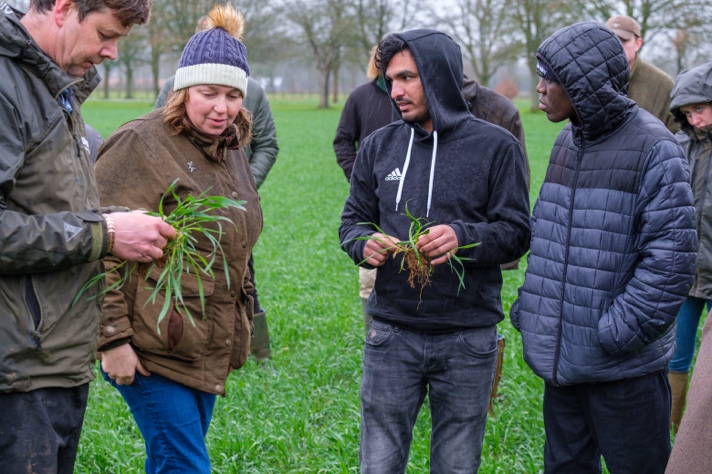
Our recent increased HEIF funding allocation has allowed the RAU to enhance its capacity to improve the leadership and support of our KE activity and lay the foundations to deliver an ambitious and aspirational programme of activity going forward, underpinned by our new RAU Strategy and building on the extensive and diverse portfolio of KE already being delivered.
We will continue to transform and reposition our research and knowledge exchange strategies, culture and support systems with the aim of expanding our portfolio further. We have established dedicated Research and KE Office across the university to provide support for academics seeking partnerships as well as leading on relevant partnerships and engagements externally. The RAU has developed a new ‘KE Framework’ to aid staff to identify new opportunities for engagement, and further committed investment for example to develop internal support systems and mechanisms to monitor, record and evaluate KE activities.
Core to delivering KE activities are our people; RAU staff and students demonstrate a strong ‘knowledge exchange mindset’ alongside their entrepreneurial spirit. The RAU has a dynamic workload model for academics across teaching and research, which allows them to meaningfully engage with the public and other communities.
During this period the RAU has commissioned expert, specialist advice on our underpinning data for KE, specifically around our public and community engagement activities. This has led to a significant increase in reported KE activities (represented in a HEIF funding uplift) and an assurance that the RAU’s KE data is continually robust. Going forward, this expert advice will continue for the immediate future to build and inform our own knowledge base.
The University has also recently committed to and engaged in external KE support through Knowledge Transfer Partnerships (KTPs) and other associated business support programmes and networks (e.g. the South West KTP Practitioner Network, GuildHE Knowledge Transfer Network). We have recently become a Knowledge Base and are in the process of building our expertise and capacity in partnership with other universities including the University of Exeter. We have a developing KTP pipeline; several members of our institutional professoriate have committed to being Knowledge Base supervisors and have identified opportunities for KTPs. We are also developing our approach in line with the KE Concordat which we have joined.
Aspect 3: Activity
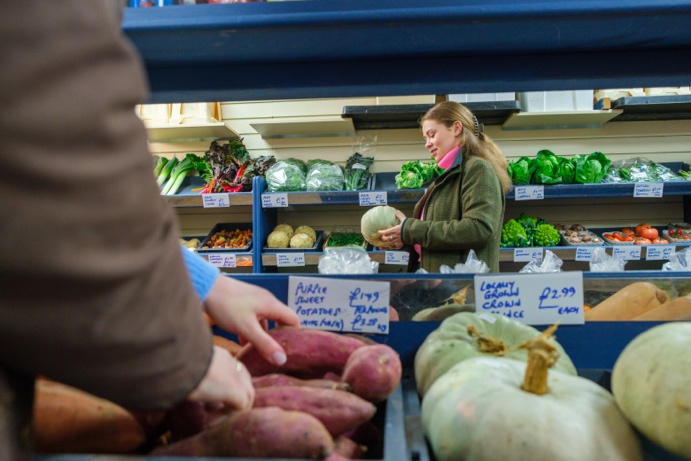
Our knowledge exchange approach for public and community engagement focuses around two of the seven core areas of activity:
Civic mission
Capital projects and estates
The activities detailed below provide a select set of examples, representative of the breadth and depth of our portfolio and evidence of our investment, impact and growth achieved through the period of this report. The activities are complementary and synergistic to those detailed in ‘Local Growth and Regeneration’.
Civic mission
Over the period August 2019 – July 2022 we have closely monitored and reported on our external social and cultural engagement activities and as part of these, events open to the public and wider community.
Our overall event and engagement numbers have increased steadily from around 150-200, through the pandemic period when, in line with the rest of the world, the RAU shifted our entire business online. Staff engagement in KE activities have also steadily increased, doubling from 149 to 293 staff days from the start to the end of the period reflecting RAU staff and student commitment.
Our audience numbers for events understandably reflected the COVID-19 period, with both 2019/20 and 2021/22 being of the order of 1.8M, rising significantly to over 5M in 2020/21. Our audiences at public lectures and events have remained fairly consistent at around 10,000, and we are delighted to report that of these public engagements, on average 80% are free of charge during the period.
Our staff and students are involved in a range of KE public engagement activities through lectures and webinars, social media channels, podcasts, television and radio programmes, news and current affair and specialist factual documentaries, many with a global reach in their millions (e.g. Discovery Science Channel, PBS, Channel Four, BBC Coast, Country File and Farming Today). Events range from the local to the global.
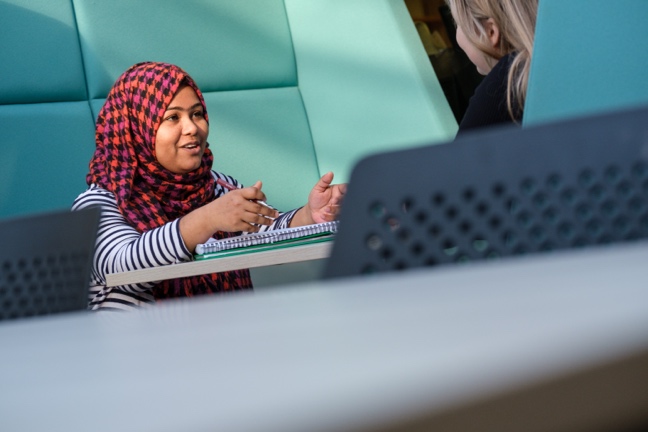
March 2020 saw the 175-year Anniversary of the RAU, founded in 1845, and this event, the Anniversary Lecture ‘Richard Williamson talks farm business strategy’ was delivered by alumnus Richard Williamson of Beeswax Dyson Farming with 145 guests. This was followed by our annual Bledisloe Lecture, delivered by Helen Browning, CEO of the Soil Association, in conversation with alumnus Jonathan Dimbleby, focussing on the existential challenges and opportunities around climate change, regenerative agriculture and the impact of diet on human health and well-being, and was held online.
A team of our academics gave talks on the ‘Feeding the World’ stage at the 2022 New Scientist Live event, with an audience of around 8,000 per day, including the best-attended talk over the entire event. One of our leading Professors has been invited by the organisers to present on the larger ‘Our Planet’ stage in 2023.
In the press and media, key notable events include a film ‘In search of the lost Viking Army’ and TV programme ‘Secrets of Althorp’ (both Channel 4/PBS) by a leading RAU Professor, writer and TV presenter, attracting public audiences of 2M. A local television broadcast ‘What’s really in my food?’ in September 2021 attracted over 200,000 viewers. Our work with the Science Channel includes regular contributions to their most-watched series ‘What on Earth’ (series 7-9) and a documentary. ‘The lost colony of Roanoke – new evidence’ followed our students and staff on a research project in North Carolina.
We engage with the local farming community, including a presence at the local ‘Three Counties Show’, engaging with the Soil Association Farmers and Growers Board, Cotswold Arable Study Group, Burford Farmers Club and the Gloucestershire Wildlife Trust Farm Advisory Group.
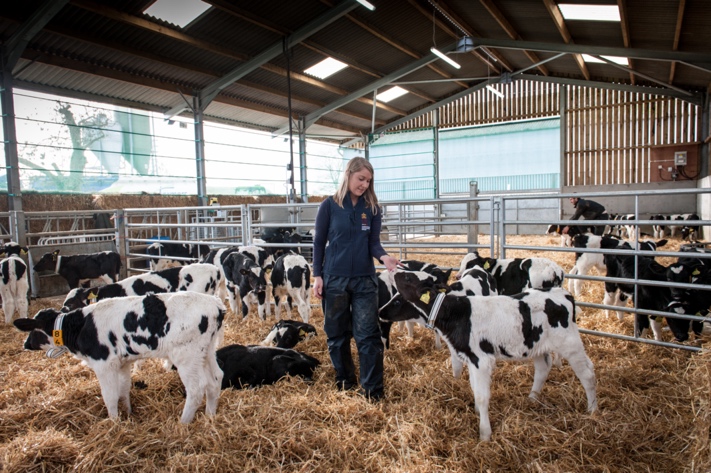
We also have an active and growing programme working with local schools and colleges, including sharing knowledge on food and farming. Encouraging STEM as a career opportunity amongst schools led to the development of a ‘Discover STEM’ event at Farm491. A local school brought 50 school children who spent the day engaging with robotic sprayers and drones, as well as learning how to make bubble tea, led collaboratively with Campden BRI.
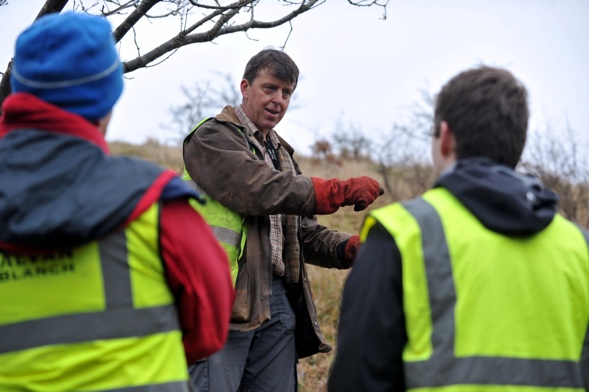
In 2022, we ‘twinned’ with Sumy National Agrarian University (SNAU) (Ukraine) and have been working closely together on KE, research, training and teaching. The University is hosting a British Academy ‘Researchers at Risk’ Fellowship from SNAU, and our university community raised £10,000 to help reconstruct greenhouses damaged during the Russian Invasion.
The RAU has an extensive and well-established alumni network constituting approximately 17,000 members and reaching back to the 1950’s. The network encompasses particular expertise in rural land management, equine science and agricultural management, providing a unique opportunity for KE activities. The alumni office runs a variety of events with a focus both on social engagement and knowledge exchange.
In 2022 we significantly invested in and updated the RAU website to improve experience and accessibility across all user groups. As part of the exercise greater visibility was given to the KE activities of the University.
During the pandemic, we provided additional value to our alumni base around support with professional development of leadership and skills, pivoting our planned series of lectures marking the RAU’s 175 anniversary into alumni KE lectures. Topics included regenerative agriculture and climate change, the challenges of largescale production agriculture, in-depth profiles of individual businesses, heritage and a land management panel debate. These lectures were led by a combination of alumni and/or industry and policy leaders, including Helen Browning, Alastair Martin, Christine Tacon and Sir Peter Kendall. The online lectures and YouTube videos resulted in an audience of over 3,000 alumni.
Capital projects and estates
We have a commitment to supporting our local community, providing access to our grounds and facilities, for example the Park Run and supporting local charities through fundraising events during the Raise and Give Week by our students. Our estate supports a wide range of activities, from events, access to wildlife areas, and as a platform for growing and developing sustainable products.
Funded by the European Regional Development Fund (EDRF) the Wild Campus Project is making transformational changes to the areas surrounding the RAU and Cirencester College by developing habitats that connect wildlife populations. In 2022 we opened up the site to a wider audience, inviting local visitors as well as a cohort from our International Language School to observe the area and engage with activities, in addition to visiting around ten local schools to talk about the project and engage students in activities. The project addresses the need for a sustainable and resilient local and national economy, a focus of both the Environment Bill and the Agriculture Bill, along with local policy developments in Gloucestershire, and aligned with local infrastructural and community growth agendas, and won the ‘Environmental Project of 2022’ award from the Cirencester Chamber of Commerce.
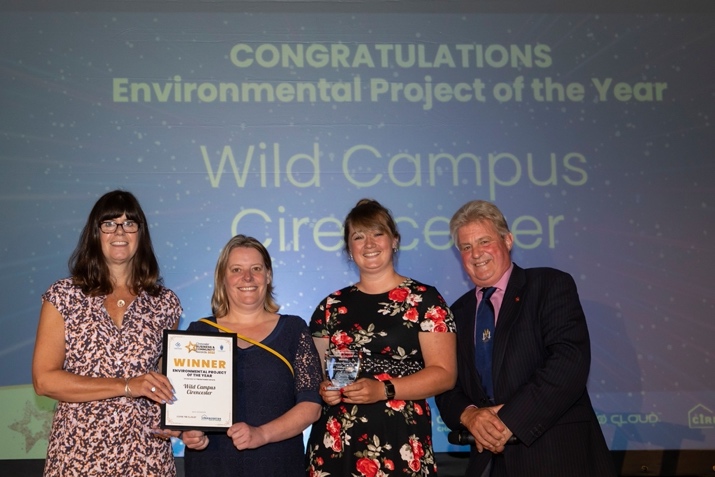
During COVID-19 we provided community support through the ‘Feeding the 5,000’ project. ‘The Long Table’, a joint initiative with the Diocese of Gloucester. We delivered over 50,000 meals (of which 80% were free of charge) to help provide meals to those in need, working with the Bishop of Gloucester to lobby and raise funds. The RAU also provided facilities for a COVID-19 testing unit, and with the closure of local hostels and hotels we supported local councils in housing the homeless.
Our new Cultural Heritage Institute (CHI), the RAU’s presence in Swindon, Wiltshire is located in the heart of Swindon’s cultural railway Village, and is planned to be part of a higher education ‘hub’ co-located with several UK universities. The CHI has dedicated state of the art lecture theatre that has been utilised to host hosted heritage events and lectures.
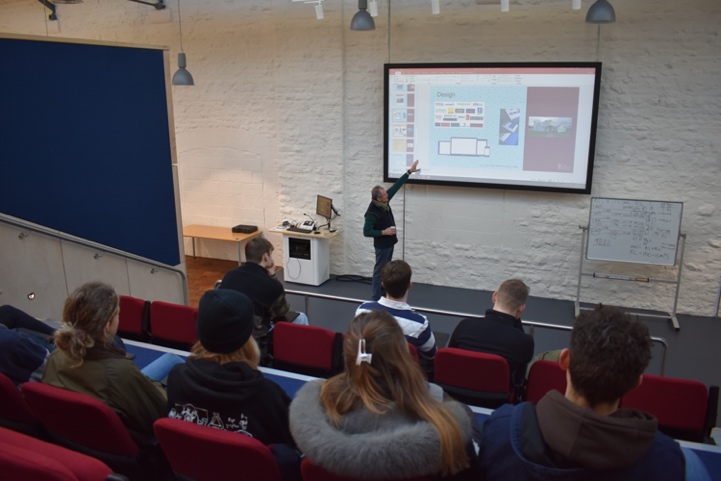
Our committed £100M investment in Innovation Village and £30M investment in our wider campus is part of our long-term plan for optimising the use of our estate for not only academic, research and commercial activities but also our wider community.
Aspect 4: Enhancing practice
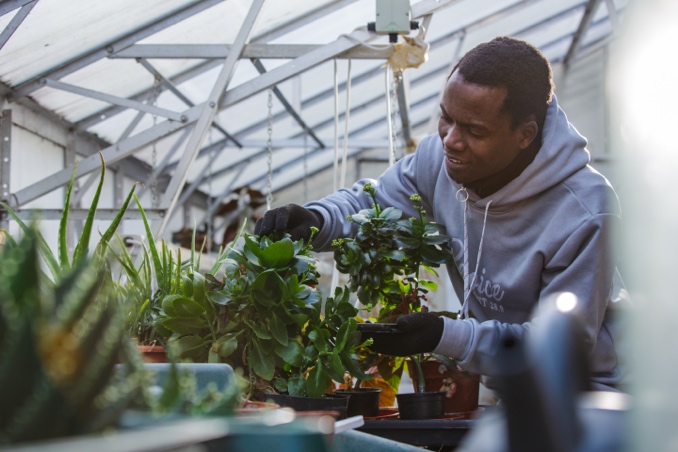
The University is investing in the support for KE, building our strategic approach, processes and systems to effectively manage and capitalise on the extensive portfolio of KE and impact delivered. The Assistant Director for Business Development leads the team providing the KE and Research Support Office (including a KE Events Coordinator monitoring and managing key events and collating and analysing KE and HE-BCI data). The Support Office works across all aspects of the University, but specifically closely with the Institutional Planning and Governance and Academic Planning and Resourcing teams responsible for data, reporting and quality.
KE objectives and KPIs are aligned with the RAU Strategy 2023-28; a new KE Framework has been developed (with seven key areas of activity) providing the structure against which activities will be monitored, evaluated and reported going forward. Our immediate priorities are to develop a robust KE monitoring and evaluation system and to embed practices in all KE activities.
Aspect 5: Building on success
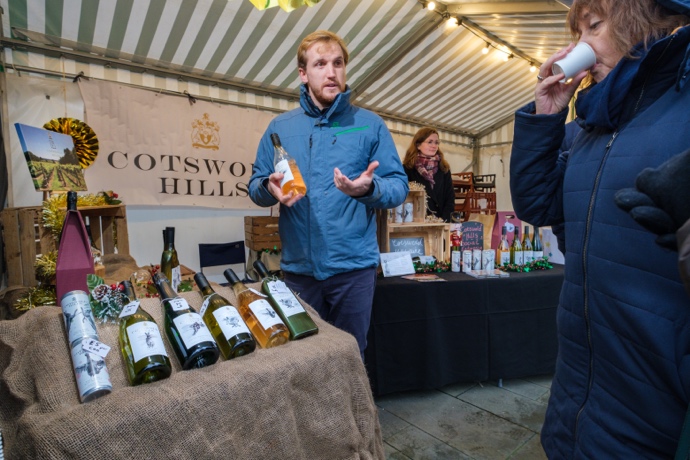
The Assistant Director for Business Development, with responsibility for KE, research and international reports to four members of the University Executive: The PVC Research, PVC Academic Resources and Planning, and Commercial Director with overall direction from the Chief Operating Officer. The KE portfolio and strategic direction is reported to the Vice Chancellors Advisory Group on a regular basis to ensure the effectiveness of the RAU KE approach. Ultimate responsibility for RAU KE activities lies with our Governing Council.
The value delivered to the RAU from our KE activity and the associated evaluation processes will inform our teaching and research practice, ensuring University courses remain relevant both locally and globally, and to ensure our growing research portfolio is applied and practice-led. We are committed developing our continual improvement as an institution, driven by our strategic intent to make a significant impact to public and community engagement through our KE activities.
Note You are currently viewing the latest version of this narrative statement. View the previous version as published in previous iterations of the KEF (KEF1 and KEF2)